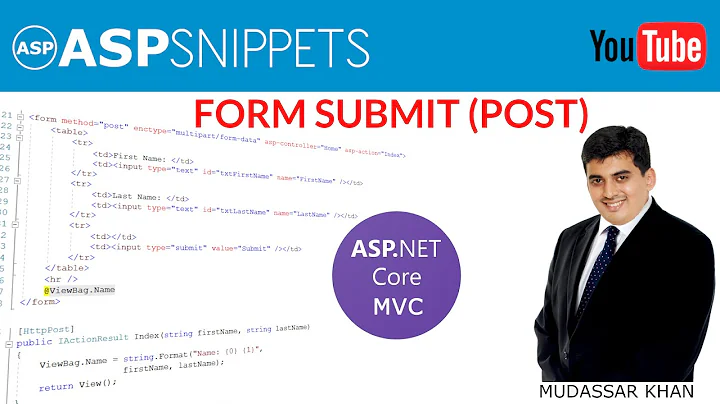ASP Core 2 empty POST request
Solution 1
The POST request needs to declare that the sent data is text/plain. Using the example with HttpClient:
client.DefaultRequestHeaders.Accept.Add(new MediaTypeWithQualityHeaderValue("text/plain"));
This way, your API will be able to receive your JSON as a string content.
If instead you want to receive your content deserialized into the original model object, you need to add this header into your request:
client.DefaultRequestHeaders.Accept.Add(new MediaTypeWithQualityHeaderValue("application/json"));
and change your controller to:
// POST: api/NativeClient
[HttpPost]
public async Task<IActionResult> Post([FromBody]yourClass class)
{
[...]
Send JSON object to your API:
var Content = new StringContent(json, Encoding.UTF8, "application/json");
var response = await client.PostAsync("/api/NativeClient/", Content);
PostAsJsonAsync takes a C# Object as an input; it serializes it as a JSON string before sending it.
Instead, PostAsync can take a JSON string to send.
see this Q&A httpclient-not-supporting-postasjsonasync-method-c-sharp
see this links for more info:
Solution 2
You should deserialize JSON to some model (class), because I believe you deserialize this string anyway somewhere in your code:
public class YourModel
{
public bool _isValid { get; set; }
public string _username { get; set; }
public string _guid { get; set; }
public DateTime _dt { get; set; }
public string _ms { get; set; }
// other properties from json
}
And your action:
[HttpPost]
public async Task<IActionResult> Post([FromBody] YourModel value)
Regarding to your app:
In your app you pass json as argument to PostAsJsonAsync(), but you need to pass object and it will be parsed to JSON:
var response = await client.PostAsJsonAsync("/api/NativeClient/", yourObject);
yourObject is instance of class which should be parsed to JSON.
After comment:
Also, try to change your app code to:
HttpClient client = new HttpClient();
client.BaseAddress = new System.Uri("http://localhost:51022/");
client.DefaultRequestHeaders.Accept.Add(new MediaTypeWithQualityHeaderValue("application/json"));
var httpContent = new StringContent(json, Encoding.UTF8, "application/json");
var response = await client.PostAsync("/api/NativeClient/", httpContent);
Related videos on Youtube
Comments
-
 alelom almost 2 years
alelom almost 2 yearsI've got a simple HTTP POST request, which I send to an ASP Core 2 application running in localhost with Kestrel. The received data is always
nullunless I usePostAsJsonAsyncfrom another C# app.The
jsonI'm sending has this form:{ "_isValid": true, "_username": "test", "_guid": "f3f574eb-5710-43c5-a4ff-0b75866a72a7", "_dt": "2018-02-11T15:53:44.6161198Z", "_ms": "IsSelected" [...] }The ASP controller has this form:
// POST: api/NativeClient [HttpPost] public async Task<IActionResult> Post([FromBody]string value) { [...]1. Case: sending with
PostAsJsonAsyncfrom another C# appIn one case I'm successfully sending the request via another separate C# application which uses
PostAsJsonAsynclike this:HttpClient client = new HttpClient(); client.BaseAddress = new System.Uri("http://localhost:51022/"); client.DefaultRequestHeaders.Accept.Add(new MediaTypeWithQualityHeaderValue("application/json")); var response = await client.PostAsJsonAsync("/api/NativeClient/", json);The controller receives the call and populates
valuesuccessfully.2. Case: sending with an external REST client like Postman
In another case I try to send the request via another REST client, such as Postman or Visual Studio Code through REST client extension:
POST http://localhost:51022/api/NativeClient/ HTTP/1.1 content-type: application/json; charset=utf-8 { "_isValid": true, "_username": "gnappo", "_guid": "f3f574eb-5710-43c5-a4ff-0b75866a72a7", "_dt": "2018-02-11T15:53:44.6161198Z", "_ms": "IsSelected" [...] }Here the request is received by the controller, but the
string valueis alwaysnull.I've tried removing the
[FromBody]tag, checking the request header, checking the json string in the body (which is exactly the same), and other things mentioned in the references below, but nothing works.What am I missing?
Other tests tried/references
Value are always null when doing HTTP Post requests
-
 alelom about 6 yearsThanks for your answer. If I do this, I'm able to use Postman and
alelom about 6 yearsThanks for your answer. If I do this, I'm able to use Postman andYourModel valuegets correctly populated, but then thePostAsJsonAsyncdoes not work anymore: I receivenull. Any idea here? -
 Roman about 6 years@alexlomba87, do you post same
Roman about 6 years@alexlomba87, do you post sameJSON? -
 alelom about 6 yearsI already had
alelom about 6 yearsI already hadMediaTypeWithQualityHeaderValue("application/json")set in my separate C# application. If I change the controller API inPost([FromBody] YourClass classValue), however, I'm able to getclassValueonly if I send aPOSTrequest through Postman; if I usePostAsJsonAsyncthenclassValueresultsnullagain. Any idea? -
 alelom about 6 yearsYour suggestion of using
alelom about 6 yearsYour suggestion of usingPostAsyncinstead ofPostAsJsonAsyncworked. To recap, I changed the signature of the controller including theYourModelinsted of astring, then swapped the HttpClient methodPostAsJsonAsync(json)intoPostAsync(new StringContent(json, Encoding.UTF8, "application/json"). Thanks. Would you like to elaborate why it didn't work originally? I think it would be useful to have an explanation in the answer. -
 alelom about 6 yearsI see you too like @Roma edited to suggest that I swap my
alelom about 6 yearsI see you too like @Roma edited to suggest that I swap myPostAsJsonAsyncinto aPostAsync, and change my controller signature to use my Model class instead of astring. While both your answer work, I'm struggling to understand why my original solution didn't work for both types of HTTP call. Would you like to elaborate? Many thanks anyway. -
 Roman about 6 years@alexlomba87, see edit,
Roman about 6 years@alexlomba87, see edit,PostAsJsonAsync()should work now






